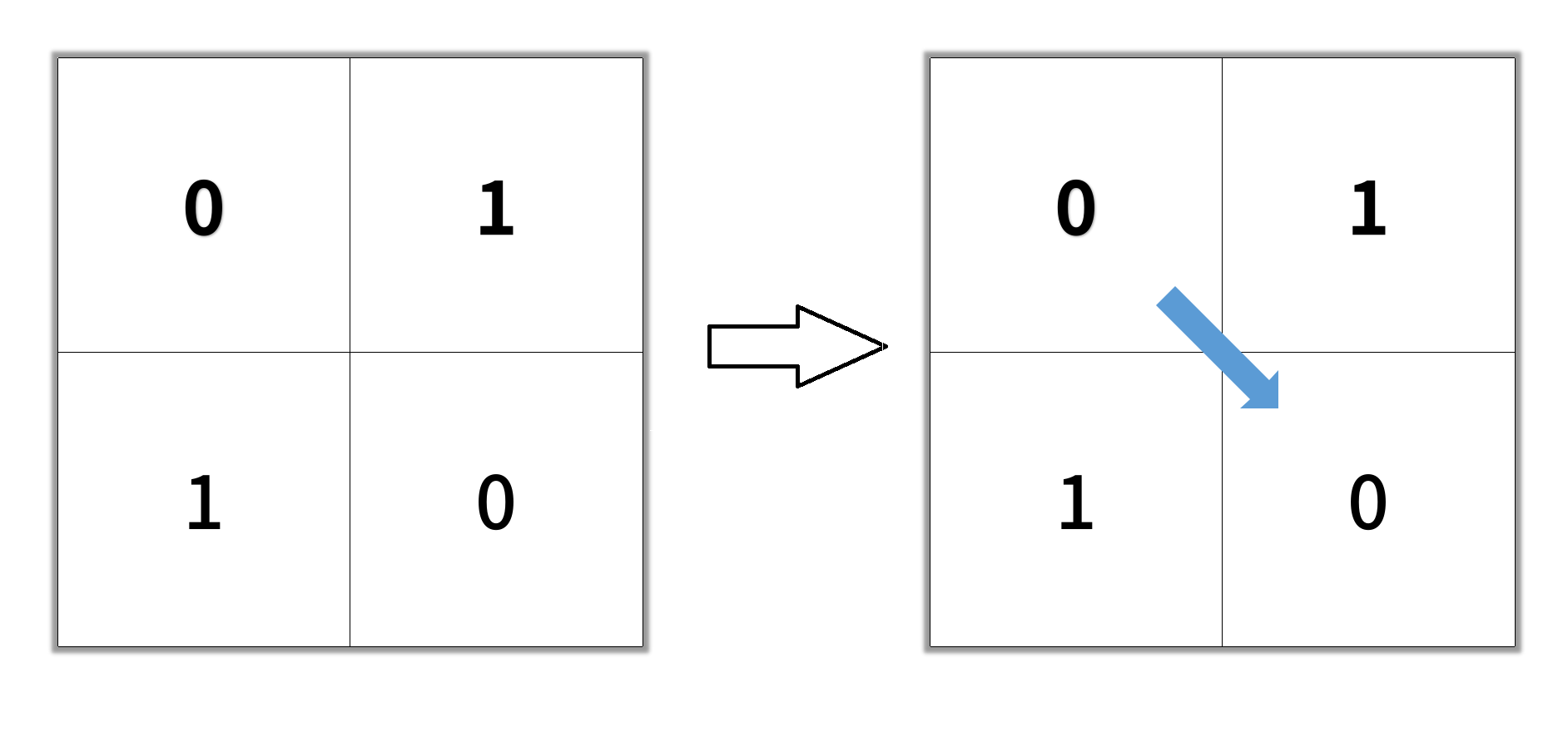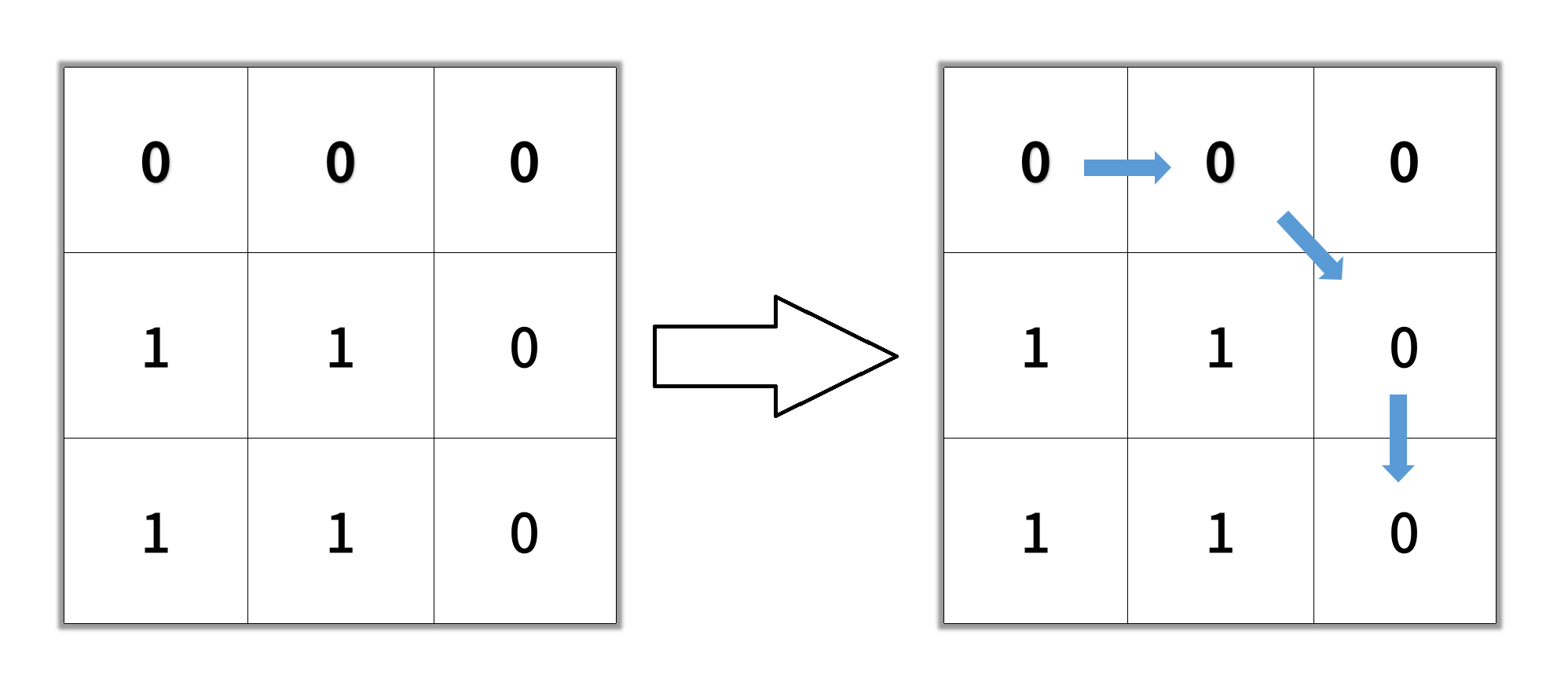Given an n x n binary matrix grid, return the length of the shortest clear path in the matrix. If there is no clear path, return -1.
A clear path in a binary matrix is a path from the top-left cell (i.e., (0, 0)) to the bottom-right cell (i.e., (n - 1, n - 1)) such that:
- All the visited cells of the path are
0. - All the adjacent cells of the path are 8-directionally connected (i.e., they are different and they share an edge or a corner).
The length of a clear path is the number of visited cells of this path.
Example 1:
Input: grid = [[0,1],[1,0]] Output: 2
Example 2:
Input: grid = [[0,0,0],[1,1,0],[1,1,0]] Output: 4
Example 3:
Input: grid = [[1,0,0],[1,1,0],[1,1,0]] Output: -1
Constraints:
n == grid.lengthn == grid[i].length1 <= n <= 100grid[i][j] is 0 or 1
Related Topics:
Array, Breadth-First Search, Matrix
// OJ: https://leetcode.com/problems/shortest-path-in-binary-matrix/
// Author: github.com/lzl124631x
// Time: O(N^2)
// Space: O(N^2)
class Solution {
public:
int shortestPathBinaryMatrix(vector<vector<int>>& G) {
if (G[0][0] == 1) return -1;
int N = G.size();
vector<vector<int>> dist(N, vector<int>(N, INT_MAX));
queue<pair<int, int>> q;
q.emplace(0, 0);
dist[0][0] = 1;
while (q.size()) {
auto [x, y] = q.front();
q.pop();
for (int dx = -1; dx <= 1; ++dx) {
for (int dy = -1; dy <= 1; ++dy) {
if (dx == 0 && dy == 0) continue;
int a = x + dx, b = y + dy;
if (a < 0 || a >= N || b < 0 || b >= N || G[a][b] == 1 || dist[a][b] != INT_MAX) continue;
dist[a][b] = dist[x][y] + 1;
q.emplace(a, b);
}
}
}
return dist[N - 1][N - 1] == INT_MAX ? -1 : dist[N - 1][N - 1];
}
};Or
// OJ: https://leetcode.com/problems/shortest-path-in-binary-matrix/
// Author: github.com/lzl124631x
// Time: O(N^2)
// Space: O(N) for elements in the queue
class Solution {
public:
int shortestPathBinaryMatrix(vector<vector<int>>& A) {
if (A[0][0]) return -1;
int N = A.size(), ans = 1;
queue<pair<int, int>> q{{{0,0}}};
while (q.size()) {
int cnt = q.size();
while (cnt--) {
auto [x, y] = q.front();
q.pop();
if (x == N - 1 && y == N - 1) return ans;
for (int dx = -1; dx <= 1; ++dx) {
for (int dy = -1; dy <= 1; ++dy) {
if (dx == 0 && dy == 0) continue;
int a = x + dx, b = y + dy;
if (a < 0 || b < 0 || a >= N || b >= N || A[a][b]) continue;
A[a][b] = 1;
q.emplace(a, b);
}
}
}
++ans;
}
return -1;
}
};
